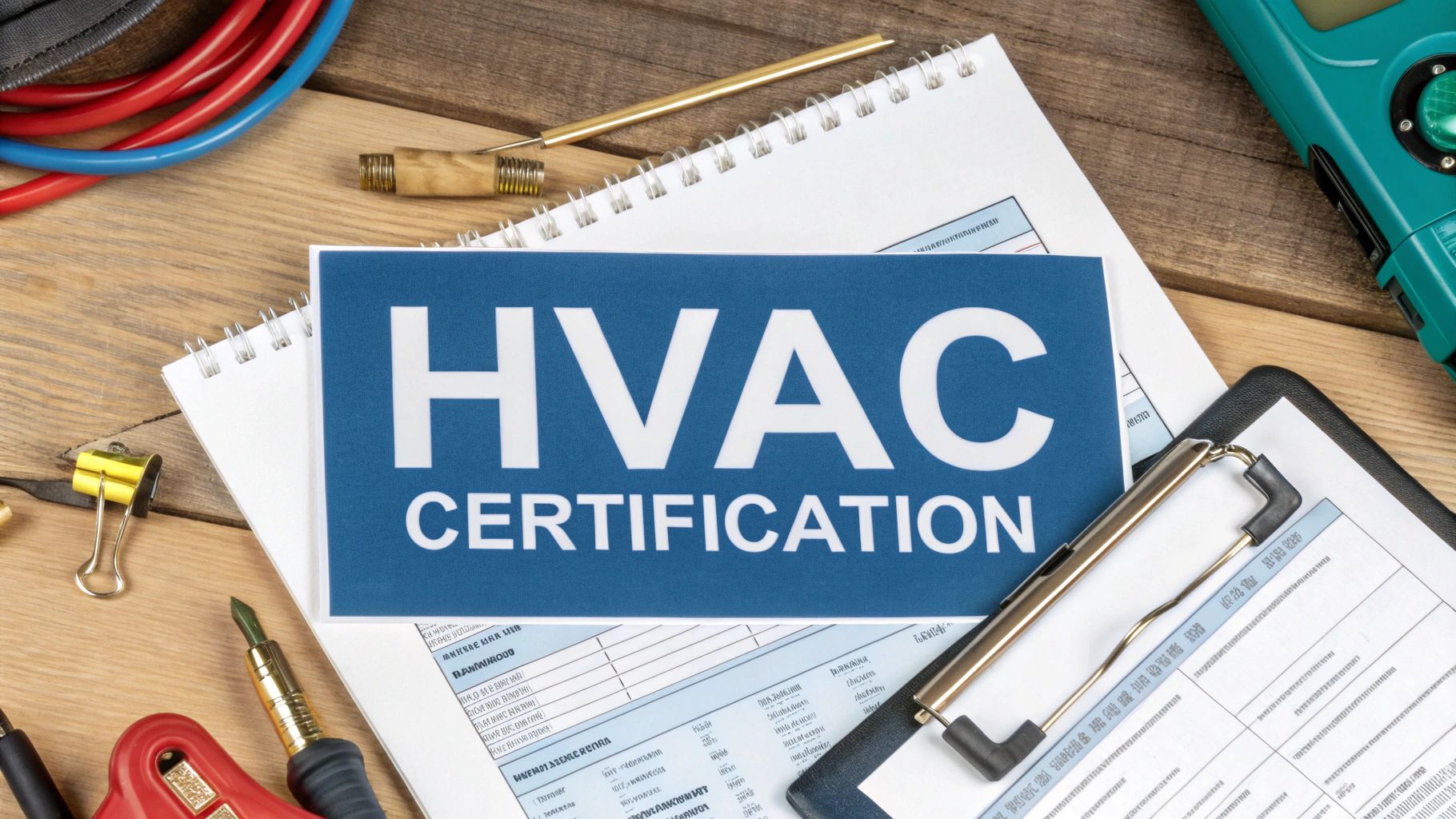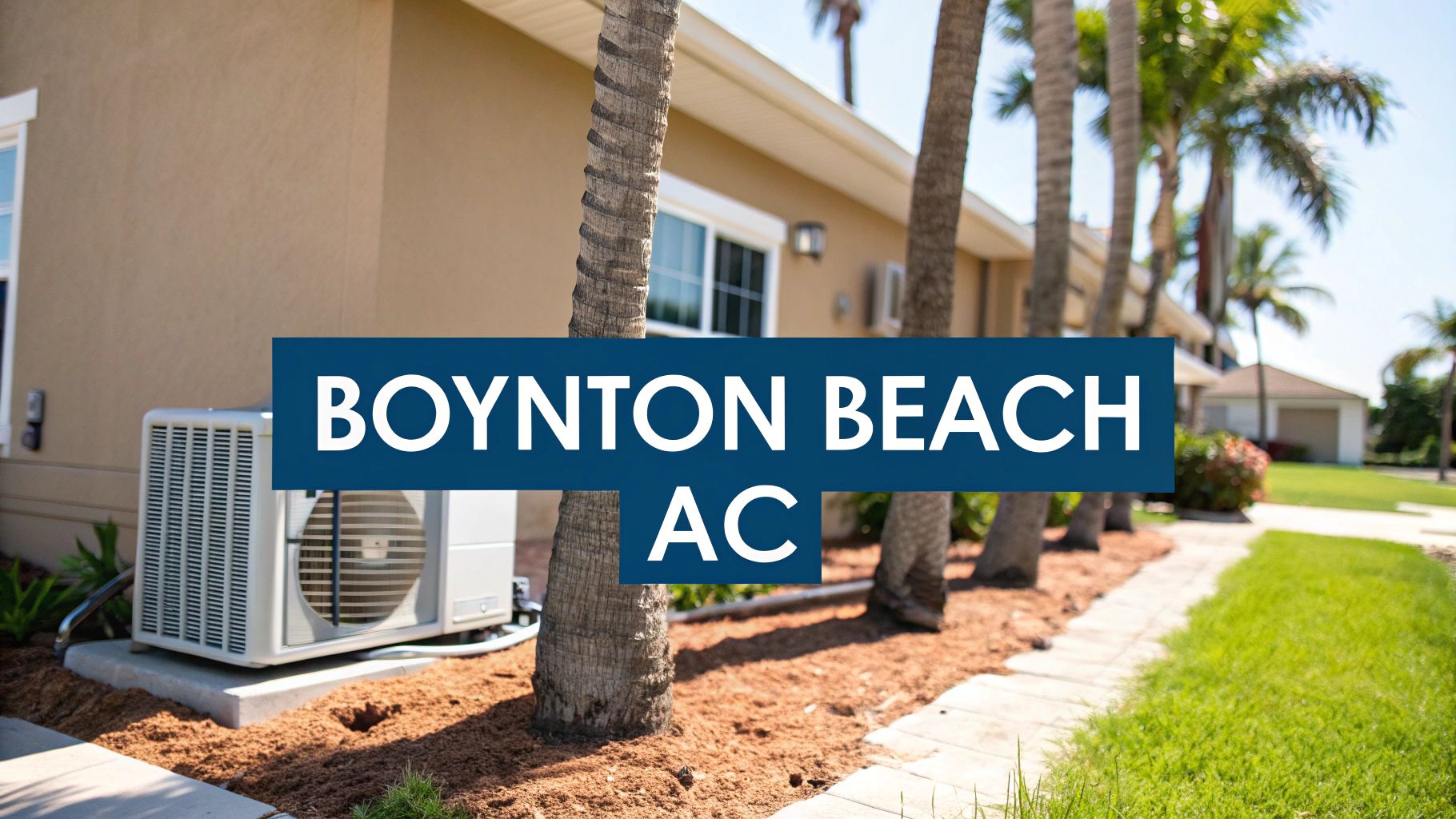If you're thinking about a career in HVAC, you might be wondering where to start. It all boils down to one thing: getting the right certifications. These aren't just pieces of paper; they're your ticket to a solid, well-paying career that proves you know your stuff and are committed to doing the job right.
While the specific HVAC technician certification requirements can differ, they all share the same goal of confirming your expertise.
Your First Step Into an HVAC Career
Jumping into heating, ventilation, and air conditioning is a great move, especially with the industry growing as fast as it is. Think of your certifications as the foundation of a house. You can't build a strong, lasting career without a solid base, and that's exactly what these credentials provide. Without them, you're just someone with a toolbox; with them, you're a professional people can trust.
These certifications aren't just for show, either. In many cases, they're required by law—especially the federal EPA certification needed to handle refrigerants. Nailing down these credentials opens up a world of opportunities that directly affect your job prospects and how much you can earn.
Why Certifications Matter
- More Job Opportunities: Let's be blunt: many companies won't even look at an application without the basic certifications. They're your key to getting an interview.
- Higher Earning Potential: Certified techs almost always make more money. It also puts you in line for promotions and more specialized, higher-paying work.
- Instant Credibility: Having a certification tells employers and customers that you've been properly trained and meet professional standards. It builds immediate trust.
- Long-Term Job Security: Skilled HVAC technicians are always in demand. The U.S. is expected to have about 42,500 job openings for HVACR technicians every year, with the field projected to grow 5-6% between 2022 and 2032.
Once you've got your certifications in hand, you need to show them off. That's where a great resume comes in. Learning the art of crafting a compelling HVAC resume is the next critical step to landing the job you want.
Consider this guide your personal roadmap. We're going to walk through the entire process, from the first day of training to passing the specific exams and getting the licenses you need to thrive. We’ll break it all down so you can focus on what matters and start building your career with confidence.
Building Your Educational Foundation
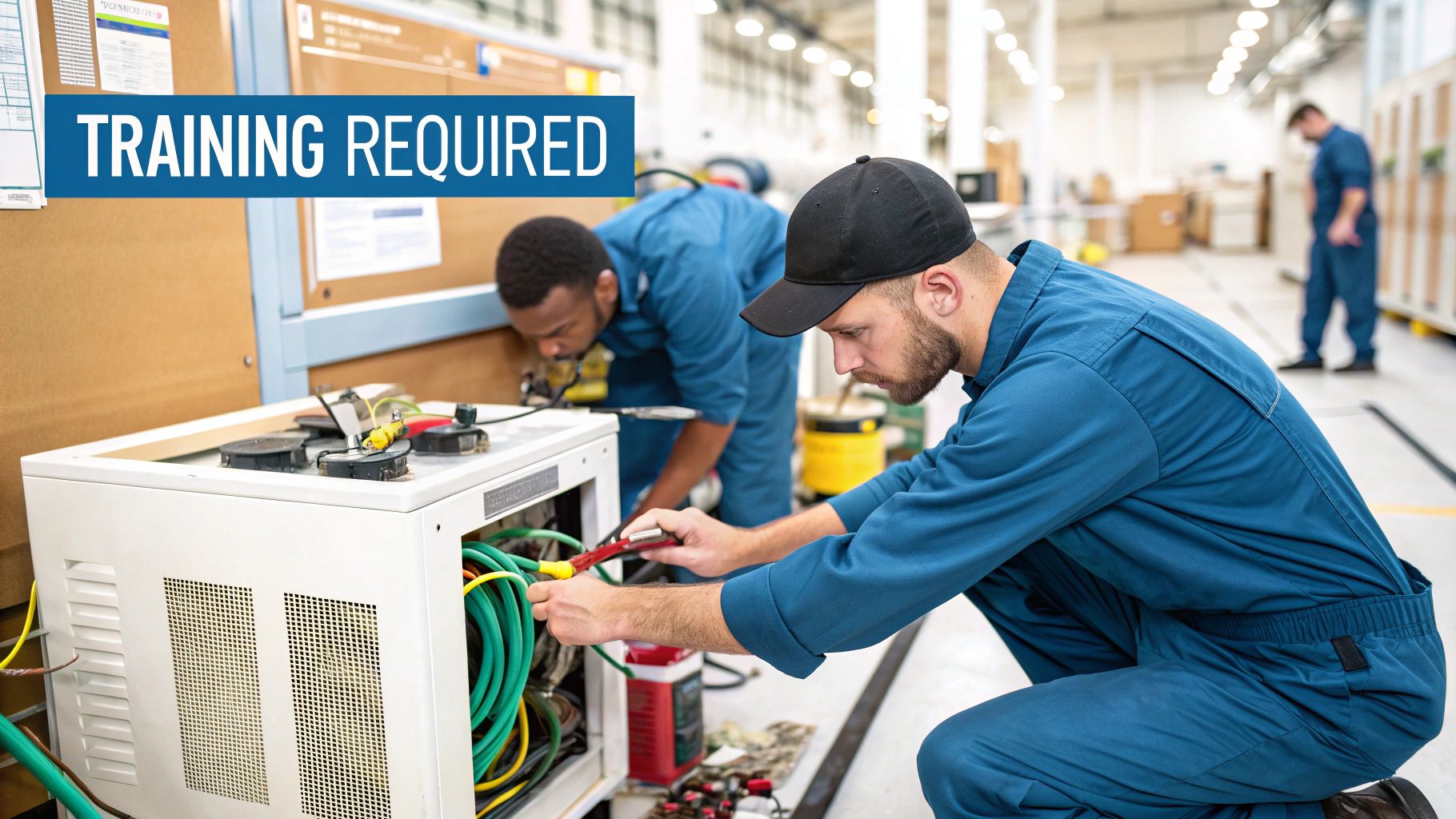
Before you can even think about certification exams, you need a solid base of knowledge. It’s a lot like a chef learning their knife skills before trying to create a gourmet meal; that foundational training is everything. For HVAC, this all starts with one non-negotiable step: earning a high school diploma or a GED.
Think of this as your ticket to the show. Without it, getting into a quality training program is pretty much a non-starter. Once you have that diploma in hand, you can start looking at real, specialized HVAC education.
Choosing Your Training Path
There are a few different roads you can take to get the hands-on skills this trade demands. Each one is built to get you ready for the real-world challenges you'll face and the tough certification exams that come with the territory.
- Trade Schools and Vocational Institutes: These are your fast-track options. They are laser-focused on HVAC, offering intense, hands-on programs you can often finish in just 6 to 12 months. The goal here is to get you skilled and out in the field, fast.
- Community Colleges: If you want a deeper understanding of the science, a community college is a great choice. They offer associate degree programs that usually take about two years and give you a broader education, blending HVAC theory with general studies.
- Apprenticeships: This is the "earn while you learn" route. You get paired with a seasoned pro, working on real job sites and getting paid for it, all while attending structured classroom training.
No matter which path you pick, the objective is the same: to build your skills and confidence from the ground up.
What You Will Learn in an HVAC Program
Proper training is about more than just knowing how to turn a wrench; it's about understanding why you're doing what you're doing. You'll dive into the core concepts that make modern heating and cooling systems tick.
Your coursework will give you a fundamental grasp of thermodynamics, electrical circuits, and the properties of different refrigerants. This is the knowledge that separates a true professional from a tinkerer. It’s what lets you diagnose a complex problem instead of just making guesses.
Most programs mix classroom theory with time in the shop, working on actual equipment. You'll learn practical skills like brazing copper lines and performing essential maintenance, like what we cover in our guide on how to clean air conditioning coils. This blend of book smarts and hands-on ability is exactly what you need to meet the hvac technician certification requirements and build a career that lasts.
Mastering the EPA Section 608 Certification
If there's one credential that's absolutely non-negotiable for any HVAC technician in the United States, it's the EPA Section 608 certification. Think of it as the foundational license for our trade. It’s not a suggestion—it's federal law.
Why the strict rule? It all comes down to refrigerants. These chemicals can do serious damage to the ozone layer if mishandled. The government needs to know that the person buying, handling, and disposing of them knows exactly what they're doing. Working without this certification is a serious offense, putting both you and the environment at risk.
The exam itself covers the essentials: the science of ozone depletion, the rules of the Clean Air Act, safety protocols, proper refrigerant recovery techniques, and leak detection. Passing this test is your proof that you have the core knowledge to handle these materials responsibly.
Breaking Down the EPA Certification Types
The EPA doesn't have a one-size-fits-all approach. Instead, there are four different certification types, and the one you'll need is tied directly to the equipment you'll be working on. It’s a way of making sure you have the specific knowledge for the job at hand.
Here's a quick look at how the different certification types are structured and what they cover.
| Certification Type | Equipment Covered | Common Applications |
|---|---|---|
| Type I | Small appliances with 5 pounds or less of refrigerant. | Window AC units, domestic refrigerators, vending machines. |
| Type II | High-pressure and very high-pressure systems. | Residential and light commercial air conditioners and heat pumps. |
| Type III | Low-pressure systems. | Large-scale chillers used in big commercial buildings. |
| Universal | All equipment covered by Types I, II, and III. | The master key for technicians working on a wide variety of systems. |
Choosing the right path—or aiming straight for Universal—depends on where you want to take your career. Most technicians will need a Type II certification at a minimum, as it covers the bread and butter of residential and light commercial work.
This tiered system mirrors how a career in HVAC generally progresses. You start with the basics and build your way up to more complex systems and responsibilities.
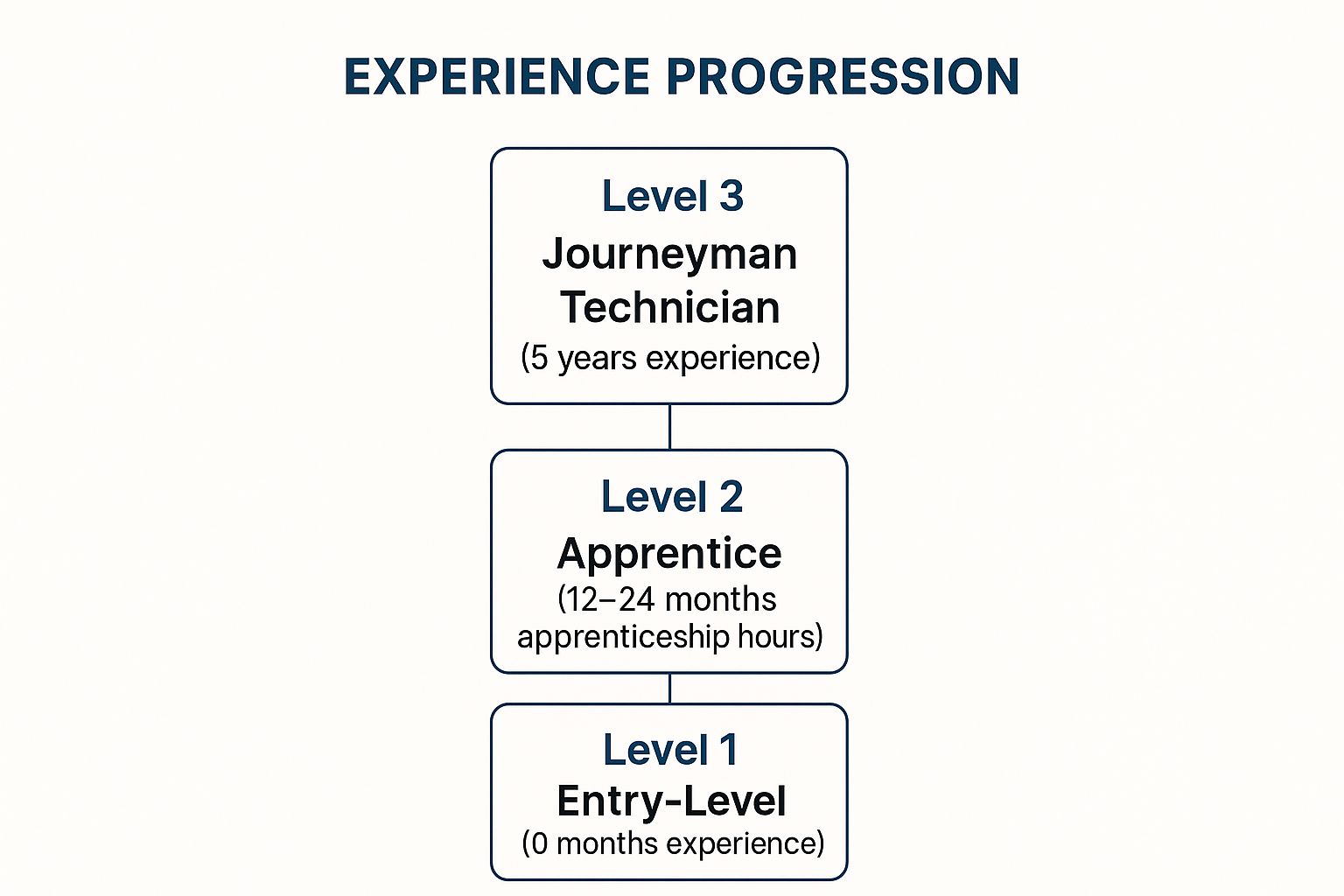
As the infographic shows, gaining hands-on experience is what elevates you from an apprentice to a seasoned journeyman. The more time you spend in the field, the deeper your understanding becomes, which directly translates to higher earning potential. It’s also why staying sharp on the fundamentals is so important. For instance, you can check out some of our AC refrigeration tips for year-round comfort to brush up on best practices.
Getting the right EPA certification is the first major step. It’s more than just a piece of paper; it’s your entry ticket into a career that demands skill, precision, and a commitment to doing things the right way.
Earning NATE Certification to Advance Your Career

While the EPA 608 certification is the ticket you need just to get in the game, earning your NATE certification is what truly makes you a pro. NATE, which stands for North American Technician Excellence, is the certification the entire industry—from manufacturers to contractors—recognizes as the mark of a top-tier technician.
Here's a good way to think about it: your EPA card is like getting your driver's permit. It proves you know the basic rules and won't be a danger on the road. A NATE certification, though? That's more like earning a commercial driver's license for handling the big rigs. It shows you've got a much deeper, real-world command of your craft.
Unlike a government exam that's all about following the rules, NATE tests your practical ability to actually install, service, and fix complex systems the right way. It’s not about just memorizing regulations; it’s about proving you can troubleshoot a tricky problem and get the job done right when you're on the clock.
Choosing Your NATE Specialization
One of the best things about the NATE program is that it isn't one-size-fits-all. The HVAC industry is highly specialized, and the certification process reflects that. You don’t just get one generic piece of paper; you build up credentials that match your specific career path.
For someone just starting out, the journey might begin with the Ready-to-Work (RTW) certificate or the HVAC Support Technician certificate for those with 6-12 months of field experience. These are great stepping stones.
From there, you dive into the core NATE program. To get certified, you first have to pass the Core exam, which covers the fundamentals every tech needs to know—safety, tools, basic science, you name it. Once you've got that under your belt, you choose one or more Specialty exams in areas like:
- Air Conditioning Installation or Service
- Gas Furnace Installation or Service
- Heat Pump Installation or Service
- Commercial Refrigeration Service
This structure is fantastic because it lets you earn certifications that are directly relevant to the work you do every day and where you want to take your career.
The Real-World Value of NATE
So, why put in the extra time and effort for NATE? Simple: it unlocks better jobs and better pay. Employers actively hunt for NATE-certified technicians because it takes the guesswork out of hiring. They know they're getting someone with proven, field-tested skills.
This trust pays off in big ways. Technicians holding a NATE certification often get more responsibility, are first in line for promotions, and can command a higher salary than their non-certified peers. That NATE patch on your uniform is more than just a logo; it’s a signal to customers that they’re dealing with a true professional, building instant confidence and justifying a higher price for your expertise. It's a critical step in meeting the hvac technician certification requirements that actually move your career forward.
Understanding Florida HVAC Licensing Requirements
So you’ve earned your certifications and proven you know your way around an AC unit. That's a huge step! But if you want to be your own boss and run an HVAC business in Florida, you'll need more than just technical skills—you need a state license.
Think of it this way: your EPA and NATE certifications are like your college degree. They show you've mastered the subject matter. The state license, however, is your business permit. It's the official green light from Florida that allows you to legally operate, pull permits for jobs, and advertise your services to homeowners.
The folks at the Florida Department of Business and Professional Regulation (DBPR) take this very seriously. Their entire system is built to protect consumers, making sure anyone running an HVAC company has real-world experience, financial stability, and knows the ins and outs of business and state law. This is a critical piece of the puzzle when looking at hvac technician certification requirements.
Certified vs. Registered Contractor Licenses
Florida gives you two main paths to becoming a contractor, and the right choice really boils down to how big you want to grow. The key difference is geography.
- Certified Contractor: This is the big one—a statewide license. With this, you can tackle HVAC projects anywhere in Florida, from the Panhandle down to the Keys. No need for extra local licenses.
- Registered Contractor: This license limits you to working in specific cities or counties. To get one, you usually have to pass a local competency exam for that particular area first.
For anyone dreaming of expanding their business, the certified license is the way to go. It offers the most freedom and potential for growth. Our team at Florida Cooling Group, for instance, operates under this statewide license, which is how we're able to serve clients across Palm Beach County and beyond. You can dive deeper into the local industry on our page covering all things related to Florida HVAC.
Key Requirements for a Florida License
Getting your contractor's license isn't just about acing a test. It's a comprehensive process designed to verify your professional background and make sure you're ready to run a business. The state wants to see the whole picture before they sign off.
To become a licensed contractor in Florida, you must demonstrate a proven blend of field experience, technical knowledge, business acumen, and financial responsibility. It's a comprehensive vetting process that ensures you are fully prepared to run a legitimate and trustworthy operation.
You'll need to pass two separate, challenging exams: a trade knowledge exam (the technical stuff) and a business and finance exam. The state also requires a solid mix of education and hands-on experience—typically four years of documented work, with at least one of those years spent in a supervisory role.
Finally, you have to prove you're financially stable and responsible. This means a credit check to show you can manage money well. It might seem intrusive, but it’s a crucial step. It shows the state you have the financial footing to run an ethical business and see your projects through to the end.
Staying Current with Continuing Education

Getting your first license is a huge milestone, but it's really just the beginning of the journey. Think of it less like a diploma you hang on the wall and more like a subscription you need to keep active. The HVAC world is always changing—new tech, updated safety codes, and shifting environmental rules pop up all the time. What you learned a few years ago might already be out of date.
That’s where continuing education (CE) comes in. It’s the ongoing professional maintenance that keeps your skills sharp and your license valid. If you let it slide, you’ll quickly fall behind the competition and, more importantly, risk losing your legal right to work in the field.
Why Continuing Education Is Non-Negotiable
For licensed contractors, CE isn't just a smart move; it’s a must-do. Most states, including Florida, require a certain number of hours to renew your license, making it a critical part of the hvac technician certification requirements. They do this to make sure every tech out there is up to speed on the latest and greatest.
Take Florida, for example. Here, licensed HVAC contractors have to complete 14 hours of board-approved continuing education every two years. It's not just busywork, either—the curriculum is carefully designed to cover the most important parts of the job.
These hours aren't just about checking a box. They're about actively improving your craft and staying on top of knowledge that protects you, your customers, and your business from big-time headaches and legal trouble.
Common Topics Covered in CE Courses
The courses you'll take are directly tied to what you actually do day-to-day. You’re not learning abstract theory; you're getting practical updates to stay at the top of your game.
You can expect to dig into subjects like:
- Workplace Safety: Keeping up with the latest OSHA standards and real-world best practices to prevent accidents on the job.
- Technical Advancements: Getting hands-on training for new high-efficiency systems, smart home tech, and the latest diagnostic tools.
- Florida Building Code Updates: A deep dive into any changes to state regulations so every single one of your installations is fully compliant.
- Business Practices: Classes on new laws that affect your business, how to handle insurance, and smart financial management.
By making a commitment to learning, you're not just staying compliant. You're making sure you remain a skilled, in-demand professional in an industry that never sits still.
Got Questions About HVAC Certifications? We’ve Got Answers.
Jumping into the world of HVAC certifications can feel a little confusing at first. Let's clear up some of the most common questions so you can see the road ahead and plan your career path.
How Long Does It Take to Get HVAC Certified?
The honest answer? It really depends on which certification you're talking about and the training route you take.
If you go through a dedicated trade school program, you can be trained and ready in about 6 to 12 months. After that, you'll need to pass the EPA Section 608 exam, which most people can knock out with a few weeks of focused study.
Now, NATE certification is a different beast. Think of it as a post-graduate degree for HVAC. You'll want at least one to two years of hands-on, in-the-field experience before even thinking about taking those exams. It’s designed to test real-world knowledge, not just what you learned in a classroom.
Is NATE Certification Actually Required by Law?
Nope. Unlike the EPA 608 certification, which is a federal requirement for anyone handling refrigerants, NATE is completely voluntary.
So why bother? Because NATE is the industry's gold standard. Earning it is like telling employers and customers, "I'm not just good, I'm one of the best." It often opens doors to better jobs and higher pay.
Do I Need a Contractor's License to Work as a Tech?
If you're planning to work for an established HVAC company, your EPA certification is usually all you need to get started. You'll be working under the umbrella of your employer's contractor license.
The contractor's license only comes into play when you decide to become your own boss. If you want to start your own HVAC business, advertise your services, and pull permits for installations, you absolutely must have a state contractor's license. It's the legal key to operating independently.
Ready to work with certified professionals you can trust? Florida Cooling Group offers expert, reliable HVAC services across Palm Beach County. Contact us 24/7 for all your heating and cooling needs at https://floridacoolinggroup.com.
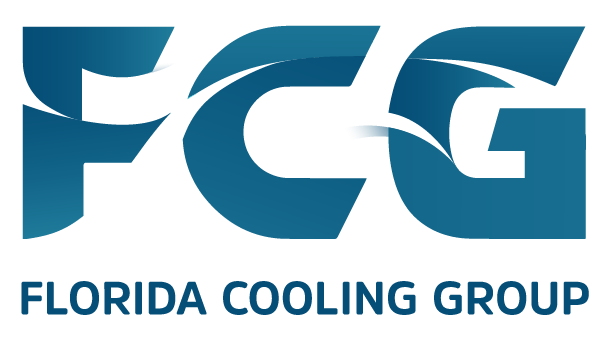
 (561) 400-2205
(561) 400-2205